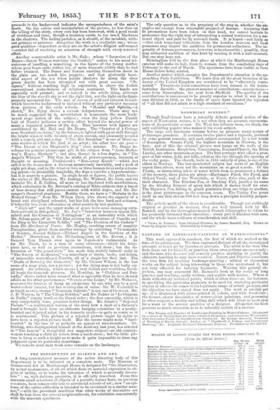THE DEPARTMENT OF SCIENCE AND ART.
A long-contemplated measure of the active directing body of this Deportment is to be initiated on a complete scale. The Museum of Ornamental Art at Marlborough House is designed for "the illustration, by actual monuments, of all art which finds its material expression in ob- jects of utility, or in works the intention of which is avowedly decora- tive " : so, with dubious precision, it is officially described. From this museum small selections of objects of a portable nature have, on previous occasions, been temporarily lent to provincial schools of art ; now " an epi- tome of the entire collection is intended to be circulated in a similar man- ner,"—with the provident condition that other works of decorative art shall be lent from the several neighbourhoods, for exhibition concurrently with the museum specimens.
The only question as to the propriety of the step is, whether the ex- amples are exempt from reasonable prospect of damage. Assuming that fit precautions have been taken on that head, we cannot hesitate to pronounce this the right way of interpreting a central institution for a na- tional object and paid for by national funds. It is hoped—and fairly so —that such temporary collections from the London museum and local possessors may inspire the ambition for permanent collections. The in- genuity of human perverseness, however, is inexhaustible ; possibly, they may extinguish ambition of that kind by meeting it with a half-measure. But one may hope not.
Birmingham will be the first place at which the Marlborough House caravan will make its halt, there to remain from the concluding days of February to the end of March. The specimens have been visible at Gore House before being started.
Another matter which occupies the Department's attention is the ap- proaching Paris Exhibition. We learn that all the great branches of in- dustry of the United Kingdom are considered to be " effectively repre- sented." Twenty-six local committees have been formed in the manu- facturing districts : the greatest number of contributors—ninety-three- come from Birmingham, the next from Sheffield. The quality of the contributions is announced to be greatly superior to what it was in our own division in 1851, as the limits of space have insured the rejection of " all that did not attain to a high standard of excellence."


































 Previous page
Previous page